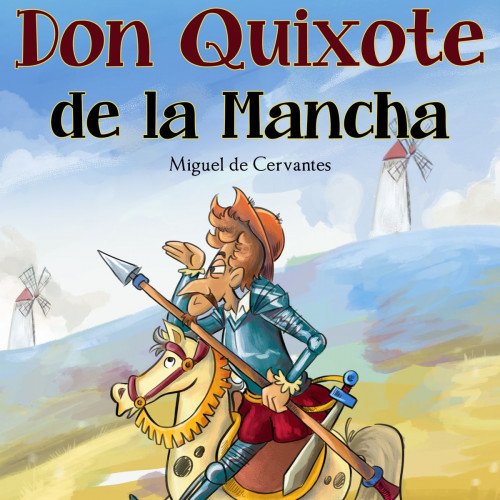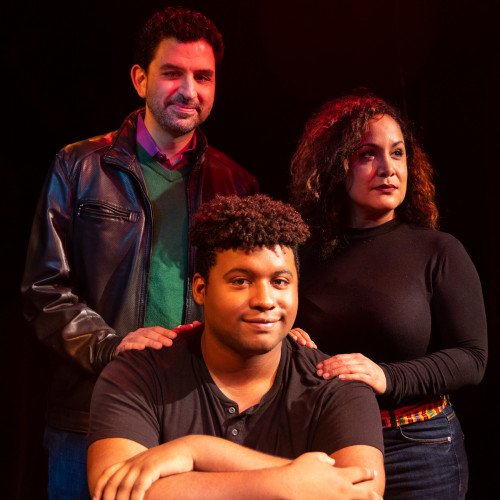"DON QUIXOTE DE LA MANCHA, DON QUIXOTE, MIGUEL DE CERVANTES" vs "OSCAR WAO, THE BRIEF WONDROUS LIFE OF OSCAR WAO, JUNOT DÍAZ"

DON QUIXOTE DE LA MANCHA, DON QUIXOTE, MIGUEL DE CERVANTES
Don Quixote is a middle-aged gentleman from the region of La Mancha in central Spain. Obsessed with the chivalrous ideals touted in books he has read, he decides to take up his lance and sword to defend the helpless and destroy the wicked. After a first failed adventure, he sets out on a second one with a somewhat befuddled laborer named Sancho Panza, whom he has persuaded to accompany him as his faithful squire. In return for Sancho’s services, Don Quixote promises to make Sancho the wealthy governor of an isle. On his horse, Rocinante, a barn nag well past his prime, Don Quixote rides the roads of Spain in search of glory and grand adventure. He gives up food, shelter, and comfort, all in the name of a peasant woman, Dulcinea del Toboso, whom he envisions as a princess. On his second expedition, Don Quixote becomes more of a bandit than a savior, stealing from and hurting baffled and justifiably angry citizens while acting out against what he perceives as threats to his knighthood or to the world. Don Quixote abandons a boy, leaving him in the hands of an evil farmer simply because the farmer swears an oath that he will not harm the boy. He steals a barber’s basin that he believes to be the mythic Mambrino’s helmet, and he becomes convinced of the healing powers of the Balsam of Fierbras, an elixir that makes him so ill that, by comparison, he later feels healed. Sancho stands by Don Quixote, often bearing the brunt of the punishments that arise from Don Quixote’s behavior. The story of Don Quixote’s deeds includes the stories of those he meets on his journey. Don Quixote witnesses the funeral of a student who dies as a result of his love for a disdainful lady turned shepherdess. He frees a wicked and devious galley slave, Gines de Pasamonte, and unwittingly reunites two bereaved couples, Cardenio and Lucinda, and Ferdinand and Dorothea. Torn apart by Ferdinand’s treachery, the four lovers finally come together at an inn where Don Quixote sleeps, dreaming that he is battling a giant. Along the way, the simple Sancho plays the straight man to Don Quixote, trying his best to correct his master’s outlandish fantasies. Two of Don Quixote’s friends, the priest and the barber, come to drag him home. Believing that he is under the force of an enchantment, he accompanies them, thus ending his second expedition and the First Part of the novel. The Second Part of the novel begins with a passionate invective against a phony sequel of Don Quixote that was published in the interim between Cervantes’s two parts. Everywhere Don Quixote goes, his reputation—gleaned by others from both the real and the false versions of the story—precedes him. As the two embark on their journey, Sancho lies to Don Quixote, telling him that an evil enchanter has transformed Dulcinea into a peasant girl. Undoing this enchantment, in which even Sancho comes to believe, becomes Don Quixote’s chief goal. Don Quixote meets a Duke and Duchess who conspire to play tricks on him. They make a servant dress up as Merlin, for example, and tell Don Quixote that Dulcinea’s enchantment—which they know to be a hoax—can be undone only if Sancho whips himself 3,300 times on his naked backside. Under the watch of the Duke and Duchess, Don Quixote and Sancho undertake several adventures. They set out on a flying wooden horse, hoping to slay a giant who has turned a princess and her lover into metal figurines and bearded the princess’s female servants. During his stay with the Duke, Sancho becomes governor of a fictitious isle. He rules for ten days until he is wounded in an onslaught the Duke and Duchess sponsor for their entertainment. Sancho reasons that it is better to be a happy laborer than a miserable governor. A young maid at the Duchess’s home falls in love with Don Quixote, but he remains a staunch worshipper of Dulcinea. Their never-consummated affair amuses the court to no end. Finally, Don Quixote sets out again on his journey, but his demise comes quickly. Shortly after his arrival in Barcelona, the Knight of the White Moon—actually an old friend in disguise—vanquishes him. Cervantes relates the story of Don Quixote as a history, which he claims he has translated from a manuscript written by a Moor named Cide Hamete Benengeli. Cervantes becomes a party to his own fiction, even allowing Sancho and Don Quixote to modify their own histories and comment negatively upon the false history published in their names. In the end, the beaten and battered Don Quixote forswears all the chivalric truths he followed so fervently and dies from a fever. With his death, knights-errant become extinct. Benengeli returns at the end of the novel to tell us that illustrating the demise of chivalry was his main purpose in writing the history of Don Quixote.
Statistics for this Xoptio

OSCAR WAO, THE BRIEF WONDROUS LIFE OF OSCAR WAO, JUNOT DÍAZ
The Brief Wondrous Life of Oscar Wao recounts the life of the title character, whose real name is Oscar de León. Oscar is a Dominican-American who grew up in Paterson, New Jersey, and struggled his whole life to find community, a sense of identity, and, above all, love. Yunior, who was Oscar’s college roommate, serves as the novel’s primary narrator. Interspersed throughout the account of Oscar’s life, Yunior recounts stories of how Oscar’s mother and grandfather suffered under the regime of the Dominican dictator, Trujillo. Yunior prefaces his biography of Oscar with a description of the legendary fukú curse that originated in Africa and arrived in the Caribbean when Spanish colonists transported slaves across the Atlantic. The curse has allegedly haunted the New World ever since. The story Yunior plans to tell is, he thinks, a fukú story. The novel’s first chapter tells of Oscar’s early years. Oscar exhibited charm and swagger as a young boy. At age seven, however, after his attempt to date two girls simultaneously went awry, Oscar’s mental health started to suffer. Puberty wreaked havoc on his body and self-confidence. Throughout high school he felt increasingly isolated and depressed, yet his desire for love only grew stronger. He fell hopelessly in love with a young woman he met in an SAT prep class but suffered intense heartbreak when she rejected him for her older, abusive boyfriend. Dispirited, Oscar left home to start school at Rutgers University. Oscar’s sister, Lola, narrates the novel’s second chapter. She recounts the tense relationship she had with her mother as she struggled to find herself during her teenage years. After her mother was diagnosed with breast cancer, Lola’s anger and grief sent her into a rebellious downward spiral. She shaved her head, and when the environment at home got too intense, she ran away to live near the Jersey Shore with her boyfriend, Aldo. Life with Aldo and his racist father drained Lola emotionally. She called Oscar and told him to meet her with money. She planned to run away and hoped he would come with her. But Oscar brought along their mother, Beli, who guilted Lola into coming home. As punishment, Lola was sent to live in the Dominican Republic with her grandmother, La Inca. Lola thrived there, and one night, La Inca told her the story of her mother’s youth. Like Lola, Beli had a rebellious adolescence. Her parents died when she was young, and La Inca, who is actually her father’s cousin, looked after her. La Inca sent Beli to a good private school, but Beli showed more interest in boys than academics. After puberty transformed her body, Beli realized the power she had over men. She avidly pursued a light-skinned boy named Jack Pujols, but a scandal ensued when they were discovered having sex in a broom closet. Jack’s family disapproved of Beli’s dark skin and working-class status. Later, at a club, Beli met a man known as “the Gangster,” who worked for the Dominican dictator, Trujillo. Beli started dating the Gangster without knowing that he was already married to Trujillo’s sister. When the Gangster’s wife found out that Beli was pregnant with her husband’s child, she sent men to beat her to death in a cane field. Beli survived but lost her baby. Fearing for Beli’s life, La Inca sent her to live in New York. Oscar remained an outcast in college. Yunior offered to move in with Oscar to impress Lola. Though initially taken aback by Oscar’s strangeness, Yunior befriended him. Darkness descended when Oscar fell in love with a student named Jenni. Oscar felt betrayed when he found her sleeping with someone else and attempted suicide by jumping off a bridge. Though physically broken, he survived and embarked on an ambitious writing project that he hoped would make him “the Dominican Tolkien.” Yunior’s narrative again moves back in time to recount the story of Oscar’s grandfather, Abelard Luis Cabral. Abelard was a respected surgeon in the Dominican Republic. He ran a clinic with his wife, Socorro, with whom he had two daughters. His eldest daughter, Jacquelyn, possessed great beauty. Trujillo had a reputation for raping young women, and Abelard worried that he would do the same to Jacquelyn. Abelard was arrested for an alleged joke that slandered Trujillo, and his arrest proved disastrous for the family. Socorro, who was pregnant with their third child at the time of the arrest, gave birth to another daughter and then committed suicide. The older two daughters both died under mysterious circumstances. The youngest daughter, Beli, was passed to distant relatives who sold her into slavery. La Inca eventually tracked Beli down and adopted her. Oscar graduated from Rutgers and started teaching at his old high school. Over the next three years, his life grew increasingly formulaic and depressing. One summer, he traveled with his family to Santo Domingo, where he met a semi-retired prostitute ten years his senior named Ybón Pimentel. True to his character, Oscar fell head over heels in love with her despite the fact that she already had a boyfriend: a cop Yunior refers to only as “the Capitán.” The Capitán learned about Oscar and became jealous. One day, when he witnessed Oscar kissing Ybón (Oscar’s first kiss ever), the Capitán had his henchmen take Oscar to a cane field and beat him. Oscar survived the attack and returned to New Jersey, but he couldn’t stop thinking about Ybón and returned to Santo Domingo the first chance he got. Ybón begged him to leave, as did his family, but Oscar refused. Eventually the Capitán caught wind of Oscar’s presence. He had his henchmen kidnap Oscar again and take him back to the cane field, where they executed him. Beli died not long after Oscar’s funeral. Lola broke up with Yunior, who had continued to cheat on her. She moved to Miami and had a baby with another man, but later moved back to New Jersey. Yunior imagined that her daughter, Isis, might one day put an end to the family curse.